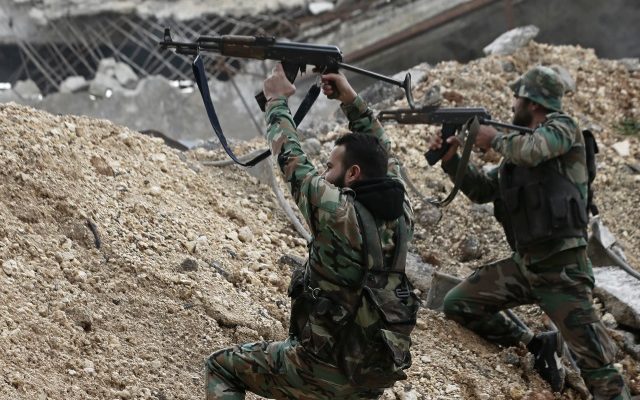Syrian and Iranian forces are reportedly conquering the area adjacent to Israel’s border, creating a new and threatening reality.
By: World Israel News Staff
Syria’s army and Iranian militias have recently made significant progress in recapturing rebel-held areas adjacent to Israel’s northern border, the latest Iranian military expansion in the war-torn country.
According to a report by Reuters, the Syrian army and the Iran-backed Shi‘ite forces advanced east and south of the rebel-held bastion of Beit Jin, backed by some of the heaviest aerial and artillery bombing since the assault to seize the area began over two months ago.
The enclave is the last rebel-held area left in the region southwest of Damascus. Sunni rebels still have a sizable presence in the Quneitra area, in the Syrian Golan Heights and right near Israel’s border.
Reuters quoted a “Western intelligence source” confirming reports that Iranian-backed militias, including the Hezbollah terror group, were playing a major role in the ongoing battles.
“The Iranian backed militias are trying to consolidate their sphere of influence all the way from southwest of Damascus to the Israeli border,” Suhaib al Ruhail, an official from the Liwa al Furqan rebel group that operates in the area, told Reuters.
Israel has repeatedly expressed concern regarding an Iranian presence on its border, a reality that would create a new and acute security threat and open another military front. Issues of concern include a “Shiite corridor” with land links from Iran to Lebanon, providing free movement for terrorists and weapons across the region.
Israel reportedly relayed a sharp message to President Bashar al-Assad’s regime in Syria earlier this month, stating that it will not accept Iranian bases or forces on its border and will act against them – and against Assad himself – if need be.
Iran is actively working to establish a military presence in Syria, augmented by Shiite militias, chiefly the Hezbollah terror group. Furthermore, Iran is reportedly working to build precision missile factories in the country as well as air and sea ports.
Iran and its proxies have been supporting the Assad regime in the Syrian civil war and have deployed a force estimated at 500 Iranian army soldiers, 5,000 Hezbollah terrorists and several thousand guerrillas from Afghanistan, Pakistan and Iraq.
In an interview with the BBC in November, Prime Minister Benjamin Netanyahu said Iran wanted to bring its air force and submarines, as well as its military divisions, very close to Israel.
Asked whether Israel would use military force to stop such developments, Netanyahu responded: “You know, the more we’re prepared to stop it, the less likely we’ll have to resort to much greater things. There is a principle I very much adhere to, which is to nip bad things in the bud.”





